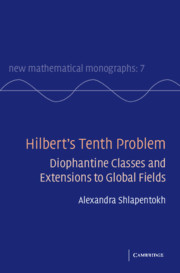Book contents
- Frontmatter
- Contents
- Acknowledgements
- 1 Introduction
- 2 Diophantine classes: definitions and basic facts
- 3 Diophantine equivalence and Diophantine decidability
- 4 Integrality at finitely many primes and divisibility of order at infinitely many primes
- 5 Bound equations for number fields and their consequences
- 6 Units of rings of W-integers of norm 1
- 7 Diophantine classes over number fields
- 8 Diophantine undecidability of function fields
- 9 Bounds for function fields
- 10 Diophantine classes over function fields
- 11 Mazur's conjectures and their consequences
- 12 Results of Poonen
- 13 Beyond global fields
- Appendix A Recursion (computability) theory
- Appendix B Number theory
- References
- Index
4 - Integrality at finitely many primes and divisibility of order at infinitely many primes
Published online by Cambridge University Press: 14 October 2009
- Frontmatter
- Contents
- Acknowledgements
- 1 Introduction
- 2 Diophantine classes: definitions and basic facts
- 3 Diophantine equivalence and Diophantine decidability
- 4 Integrality at finitely many primes and divisibility of order at infinitely many primes
- 5 Bound equations for number fields and their consequences
- 6 Units of rings of W-integers of norm 1
- 7 Diophantine classes over number fields
- 8 Diophantine undecidability of function fields
- 9 Bounds for function fields
- 10 Diophantine classes over function fields
- 11 Mazur's conjectures and their consequences
- 12 Results of Poonen
- 13 Beyond global fields
- Appendix A Recursion (computability) theory
- Appendix B Number theory
- References
- Index
Summary
In this chapter we will continue with the task of describing the known Diophantine classes of the rings of W-integers of global fields. We will start with horizontal problems. The question which we will partially answer here is the following. Does the Diophantine class of a ring of W-integers change if we add to or remove from W finitely many primes? As we will see below, we are able to show in many cases that the class does not change. We conjecture that this is true for all rings of W-integers but are unable to prove this at the present time.
The main tool used so far to prove results of the type described in this section is the strong Hasse norm principle (see Theorem 32.9 of [79]). The ideas behind the construction of a Diophantine definition of integrality at finitely many primes presented below go back to the work of Ershov and of Penzin (see [65], [26]) and to the work of Julia Robinson on the arithmetic definability of rational integers in algebraic number fields (see [81] and [82]). Robinson used quadratic forms to carry out her construction. Later, Rumely generalized Robinson's methods in his paper on arithmetic definability over global fields (see [85]). In his paper Rumely used norm equations and the strong Hasse norm principle. Kim and Roush were the first to use this methodology for the purposes of showing the undecidability of some Diophantine problems over function fields (see [42]).
Information
- Type
- Chapter
- Information
- Hilbert's Tenth ProblemDiophantine Classes and Extensions to Global Fields, pp. 44 - 65Publisher: Cambridge University PressPrint publication year: 2006
